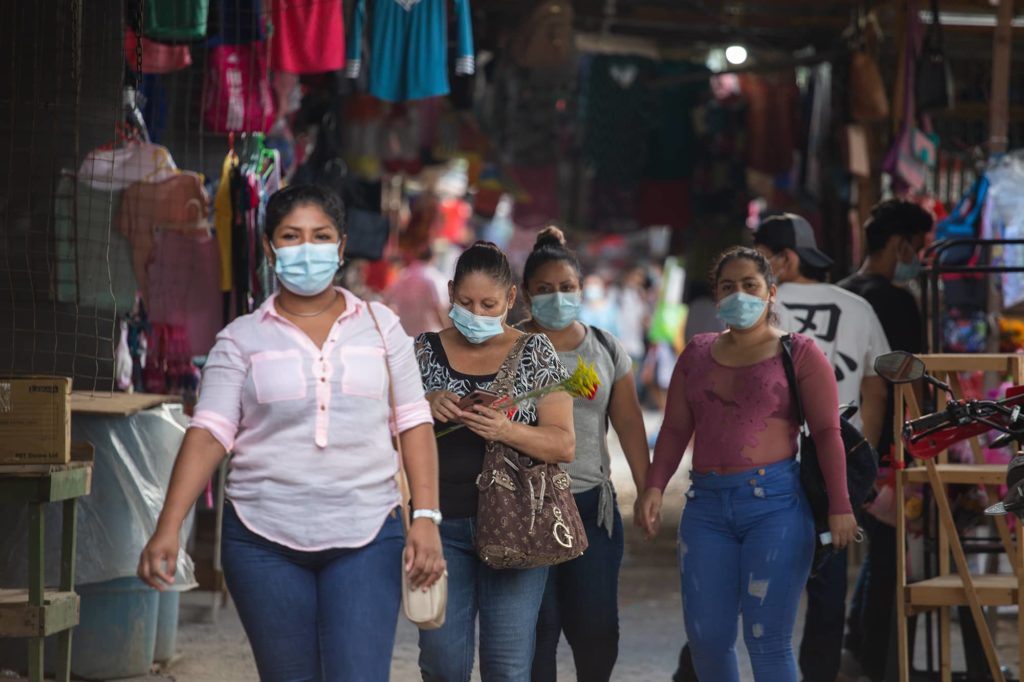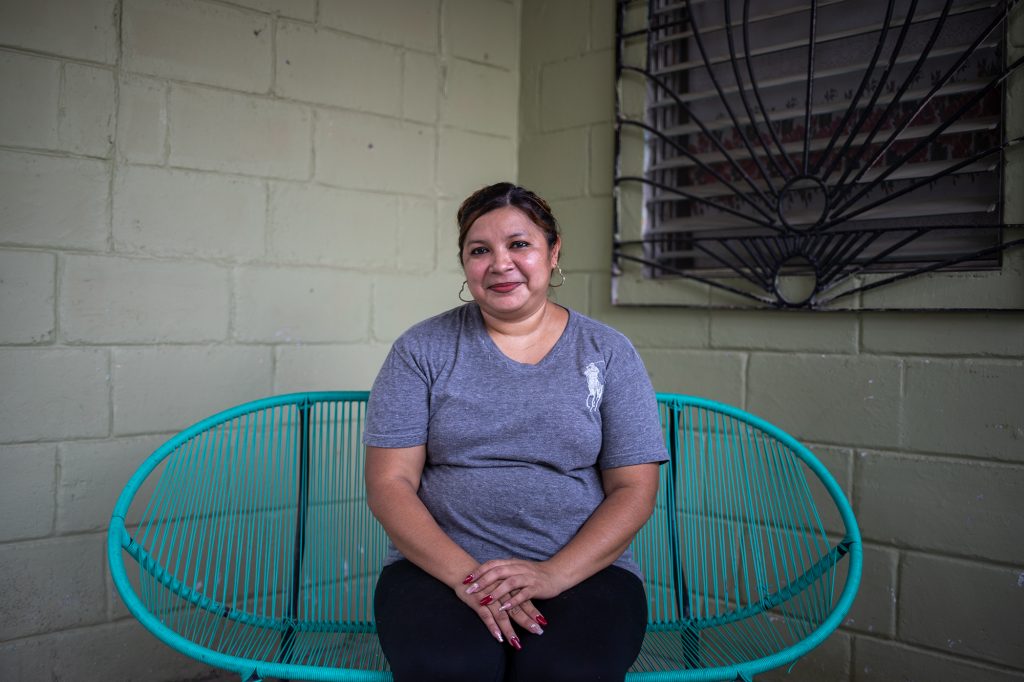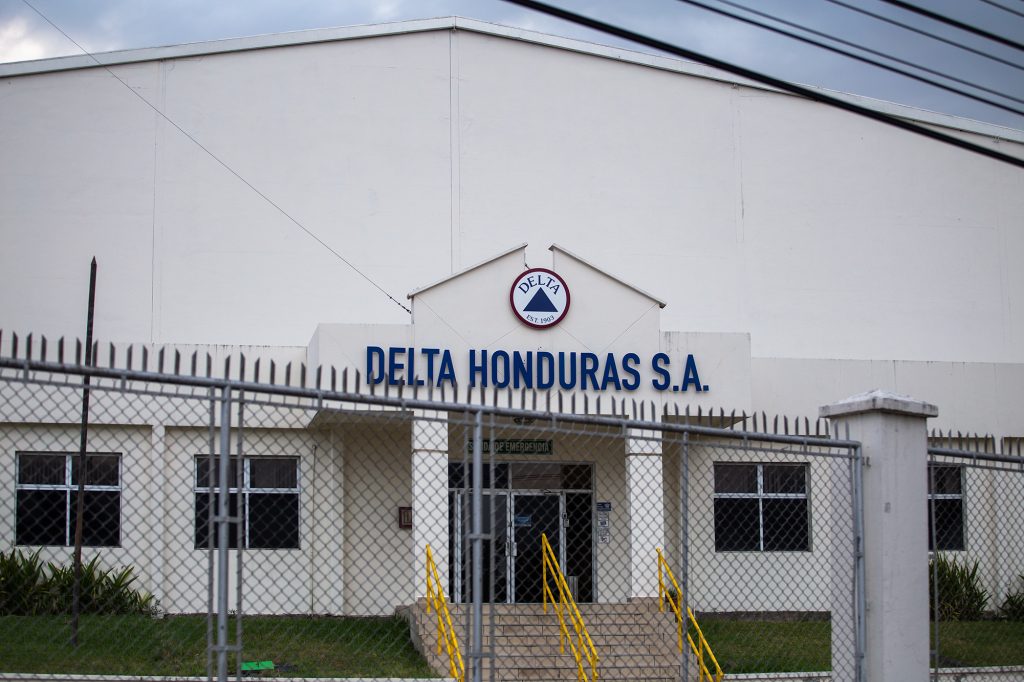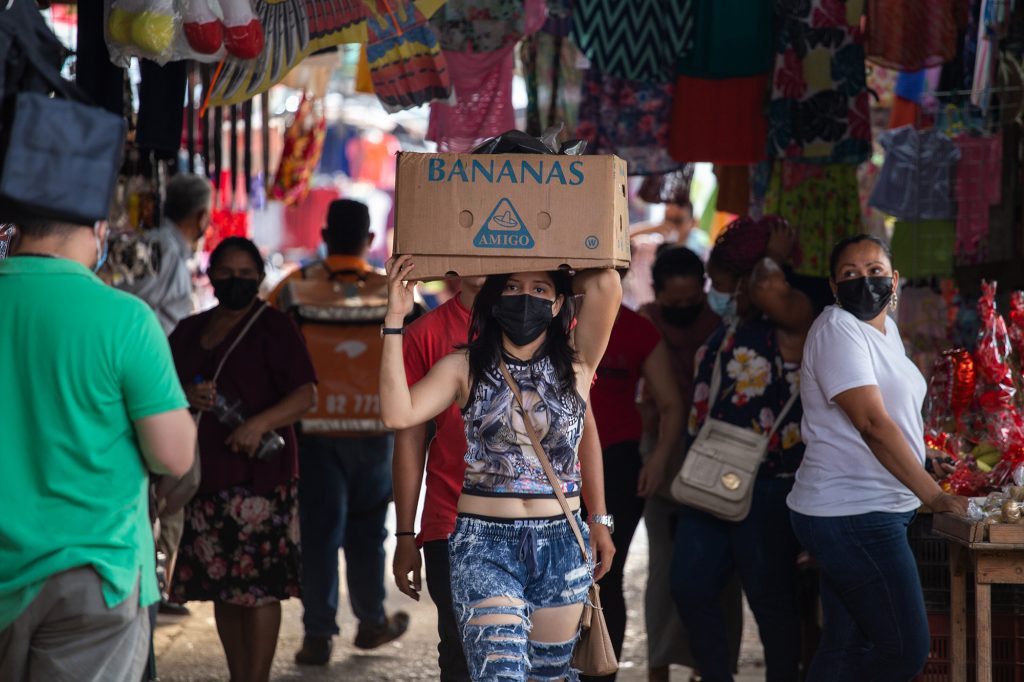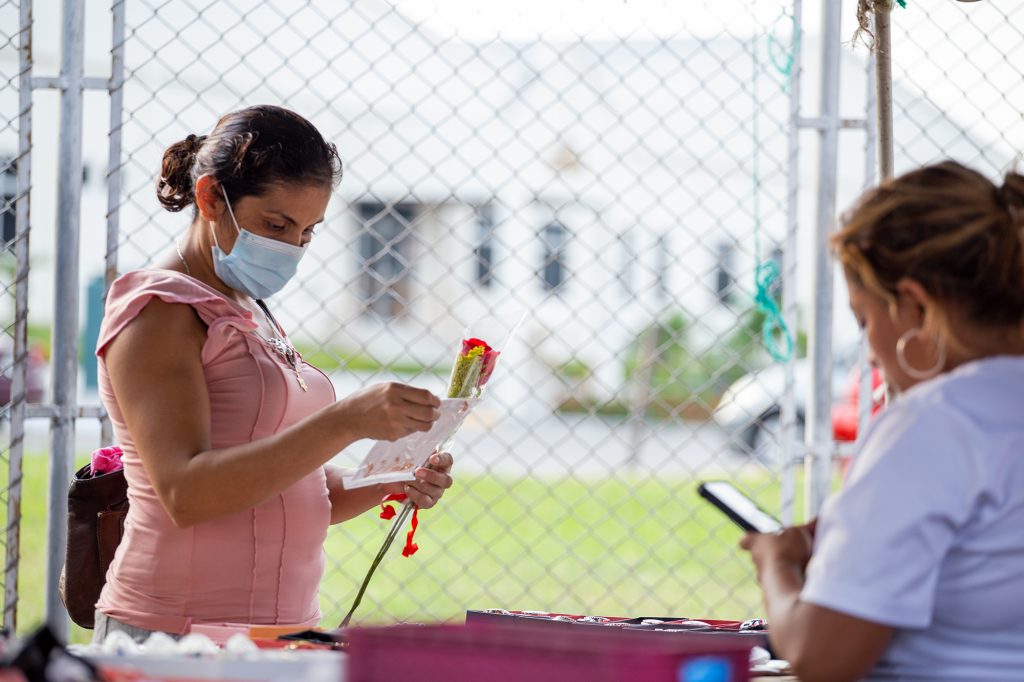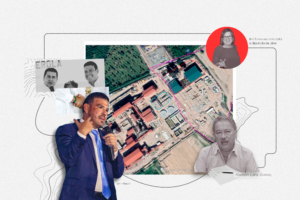Delta Apparel, a transnational clothing manufacturer, dismissed 430 workers during the pandemic. Many of them had work-related musculoskeletal conditions. Thousands more were furloughed without pay. The Ministry of Labor shut down for six months amid widespread labor abuses.
By Allan Bu
Photos by Martín Cálix
It was the 1990s, and Honduras was expanding its investment in the textile factories commonly known as maquilas. In Chamelecon, a densely populated section of San Pedro Sula, little Sonia became an orphan before the age of 10. When she finished elementary school all she wanted to do was work in a maquila and bring money home.
After losing her parents, the active young girl was left in the care of her older sister, Norma. But when Sonia left school, her childhood dreams faltered. At 17 years old she started working in a beauty salon, and the idea of working in a maquila gained strength for her again. Because she was underage, Sonia borrowed a friend’s identification documents and landed a job in a maquila. “My plan was to work in the maquila and save some money to start my own salon. But I settled into the maquila job and just stayed there until I eventually gave up on my dream of being a hairstylist,” said Sonia.
Sonia got married and had two children, Nicole and Javier. She became so accustomed to her maquila job that she stayed there for 22 years. In August 2020, one of the worst months of the COVID-19 pandemic in Honduras, Sonia was laid off by her employer, Delta Apparel, along with 430 of her coworkers. Sonia and many of her laid-off coworkers had work-related musculoskeletal conditions, and some were pregnant. Sonia has tendinitis in her shoulders that causes her severe pain. “I didn’t think my dream would turn into a nightmare, but that’s what my life has become,” she said.
Maquilas became an important source of work for Hondurans after the Law of Industrial Processing Zones for Export (Decree 37-87 dated April 7, 1987) was enacted, and the Constitutive Law of the Puerto Cortes Free Trade Zone was extended to cover the municipalities of Amapala, Tela, Choloma, Omoa and La Ceiba (Decree 787 dated July 9, 1979). These two laws launched the textile manufacturing industry in Honduras, and today there are 328 maquilas that employ 167,462 people, according to the Honduran Manufacturers Association (Asociación Hondureña de Maquiladores – AHM).
During the administration of President Manuel Zelaya Rosales (2006-2009), who was deposed in a coup d’état, there was a historic monthly minimum wage increase, from US$128 to US$228. But this minimum wage does not apply to maquila workers, as this industry has a separate wage structure. Currently, the monthly minimum wage in the maquila industry is US$367, which is lower than in other sectors that have monthly minimum wages of up to US$497.
Honduran labor leaders and social activists claim that during the pandemic (5,789 dead and 222,118 infected to date, according to government data), workers suffered countless violations of their labor rights that went unchecked by the Ministries of Justice and Labor.
María Luisa Regalado, director of the Honduran Women’s Collective (Colectiva de Mujeres Hondureñas – CODEMUH), says that circumstances for Honduran workers have been dire ever since the government declared a nationwide lockdown on March 16, 2020. The unpaid furloughs approved by the government (Decree 33-2020) only considered the maquila owners and not the needs of workers, she argues.
This executive decree authorized companies to suspend labor contracts for up to four months in order to save jobs. The furloughed workers were granted “solidarity” payments of US$242 that were jointly funded by the government and the employers. In the maquila sector, the government contributed US$142, while the employer contributed US$100.
According to the AHM website, they have 328 affiliated companies, but not all of those participated in the solidarity payment program. María Luisa Regalado stated that 105 companies participated in the program, but some only made a single payment. The Honduran government spent US$23 million on solidarity payments to furloughed maquila workers. The program lasted for three months, but not all of the participating companies fully complied.
Regalado says that what happened at Delta Apparel’s Villanueva plant, where Sonia’s dream became a nightmare, is a snapshot of what happened in the entire Honduran maquila sector. She said that the Delta workers were initially furloughed and then days later they were informed by phone of their employment termination. “The law says that if your employment contract has been suspended, your employer cannot fire you,” said Regalado.
Regalado claims that most of the 430 workers fired by Delta had occupational health conditions or were pregnant, “They called in these workers and made them sign resignation letters as a condition for receiving the solidarity payments. The workers were afraid of losing everything, so they signed. The Ministry of Labor was closed at the time due to the pandemic.”
Regalado said that a number of maquilas violated labor rights, including one in Choloma called Prime Manufacturing which forced pregnant women to work. “They made them come to work and didn’t send them to see doctors even though they had COVID symptoms,” she said.
María Elena Sabillón is a labor attorney and legal advisor for several labor organizations. She said that workers have been under attack during the pandemic, and that the labor movement has suffered in recent years. “There has been a very significant deterioration in labor rights,” she said.
In her opinion, the worker furloughs during the pandemic caused the most damage. “When the pandemic began, the need to furlough workers was obvious, and employers have the right to do this as long as they adhere to the Labor Code. The first furloughs were supposed to last 90-120 days, but as of April [2021], some workers are still on furlough, which is more than a year,” she said.
In April 2020, former Labor Minister Carlos Madero estimated that about 450,000 employees would be furloughed, according to a report by El Heraldo. This represents almost 30% of the 1.5 million jobs generated by private enterprise prior to the pandemic.
Discriminated and discarded
Sonia Perdomo is about to turn 40 and has multiple muscular symptoms: tendinitis in both shoulders, cervicobrachialgia, and a hernia – all caused by 22 years of work in maquilas. She was fired by Delta Apparel in August 2020, her employer for the last six years, despite having a work reassignment order due to her musculoskeletal conditions.
Employers are required to reassign workers who have a medical diagnosis confirming their inability to perform their current work assignments. This is a fundamental labor right that was ignored by the textile manufacturing sector during the pandemic.
“Taking the job at Delta was the worst thing I could have done. There was some exploitation at all the other companies where I’ve worked, but Delta is the worst. The exploitation and work stress caused by that company is extreme. The work environment makes employees turn on each other. These companies say that we’re their partners, but we’re just workers. I’ve always said that,” said Sonia.
Delta Apparel claims that she already had a serious health problem from her many years at other maquilas, but Sonia says that it all culminated at Delta. Her first two years there were tough because of Delta’s competitive work environment. She describes a ranking system of super worker, average worker, and subpar worker. That’s when her shoulder damage began, and discrimination soon followed. First, her immediate supervisors rejected her, then her coworkers. Nobody wanted to work with her or other people with musculoskeletal disorders.
Sonia would overhear her coworkers say, “Here comes the injured lady; we don’t want to work with her because she can’t meet the productivity targets.”
Sonia says that Delta Apparel violated labor rights in various ways during the pandemic. “The government gave them the green light to do all that. When constitutional rights were suspended, they did whatever they wanted. They took away our vacation time and began laying off massive numbers of workers, including pregnant women and people with chronic health conditions.”
Delta Apparel is incorporated in the United States and has operations in El Salvador, Mexico and the United States. It has been operating in Honduras for more than 23 years, and has a plant in Villanueva and another in Naco, both in the northern department of Cortes.
This is not the first time Delta Apparel has been accused of labor rights violations. It was sued in 2017 after firing 24 workers with musculoskeletal disorders. In 2011, workers at several transnational companies claimed to have been threatened with job termination after obtaining work reassignment rulings from the Honduran Institute of Social Security (Instituto Hondureño de Seguridad Social – IHSS), as reported by the womenhuman rights group, CODEMUH on the Honduras Tierra Libre website.
The pandemic provided an excuse for laying off additional workers in 2020. Patricia Tejada, Sonia’s friend and coworker at Delta Apparel also suffers from an occupational health condition and was laid off in August after 18 years with the company. She is currently unemployed and unwell.
She remembers how enthusiastic and energetic she was when she first started working at the maquila, and never thought that earning a living would end up seriously affecting her health. She worked at the same job for 18 years, repeating the same arm movements day after day. “I asked to be reassigned or given a different task before I got this health problem, but they refused to listen to me,” she said.
Not only was she ignored, Patricia feared retaliation if she tried to seek professional help. The pain became severe and she was having more trouble doing her work. Finally, she decided to go to a doctor. After some x-ray and ultrasound imaging, the doctor told her that one of her arms was damaged and that the other one would soon have the same condition. The doctor visits became more frequent, which affected her individual productivity and her work team’s productivity. Then her coworkers began to discriminate against her. She remembers them saying, “She’s no good to us anymore; she’s either out sick or can’t do the work well when she’s here.”
Stigmatization at work wasn’t the only impact. Before her work-related shoulder tendonitis, she earned US$73 a month – the typical wage at the time. But after she was kicked off her team and started going to the doctor, her income was cut in half because she couldn’t meet the productivity targets.
Instead of receiving support at work, she was harassed. “There were a lot of meetings with managers and supervisors. I was attacked a lot and we were discriminated against for having health problems. Our coworkers would say, ‘Oh no, she’s sick; she has an official medical diagnosis.’ It felt awful because the discrimination came from my own coworkers and supervisors. It was horrible.”
The pandemic, the home confinement, and the health emergency declaration set the stage for Delta to terminate people with occupational health conditions, alleging that they were more prone to be infected with the virus. “That’s the excuse they used because they couldn’t find a way to fire us,” said Patricia.
To keep her job, Patricia started doing several new tasks like folding T-shirts and orienting new staff. She never missed work without a good reason. She also helped distribute wages and pay slips to other workers. “I couldn’t operate a machine any longer, but I could help in other ways. Still, we were no good to them. If we couldn’t operate machines then we were useless.”
She learned of her dismissal when the company published a list of names on social media. “When I was hired, they told me, ‘We need you.’ Now in the middle of a pandemic, they threw us out like dogs, no pay or anything.”
Many maquila workers tell the same story as Sonia and Patricia. María Luisa Regalado says that maquila workers have endured numerous labor abuses and violations over the years, and according to CODEMUH data, 66% of those employed in this sector suffer work-related musculoskeletal disorders. “There are workers at companies like Gildan Activewear, a Canadian transnational, who have been fired for having work-related health conditions, and the company used the medical diagnoses issued by the IHSS to justify these terminations,” said Regalado, citing Delta Apparel as another company that fires staff in this manner.
To better understand the nature of these musculoskeletal conditions, Contracorriente interviewed Dr. Gustavo Hernandez, an orthopedist who is president of the Honduran Association for Orthopedic and Trauma Surgery (Asociación de Cirugía Ortopédica y Traumatológica de Honduras), and also a member of the Honduran Association for Occupational Health and Medicine (Asociación de Salud Ocupacional y Medicina del Trabajo). Dr. Hernandez explained that a musculoskeletal injury can be caused by a number of factors, including work activity. “The neck, shoulder, spine, wrist, hip, knees, ankles, and any joint or body part involved in physical effort or certain postures is susceptible to injury.”
A musculoskeletal condition doesn’t happen at birth because then it would be considered a deformity or congenital problem, said Dr. Hernandez. “However, a deformity or congenital problem can lead to a musculoskeletal injury. For example, a person born with a deviated spine who works carrying bags is more likely to suffer a spinal injury.” To avoid such injuries, Dr. Hernandez believes that work areas must be adapted to human beings. The mechanics of a work activity must be modified to suit the human body. “Around the world, and especially in our country, jobs are not adapted to human beings. Rather, people are forced to adapt to the job,” he said.
“To avoid musculoskeletal injuries, work areas must be adapted to human beings and not the other way around.”
Dr. Hernandez pointed to several characteristics of maquila work that make people more susceptible to injury ⎻ the volume of work and repetitive movements. “For example, if you place a pencil on a desk, it obviously won’t bother you the first time you do it. But if you have to do this five hundred times a day, your shoulder will start hurting.”
He says that some industries have been acquiring machinery that reduces the number of repetitive movements, “I’ve seen some companies investing in this new technology, but others have had their machines for 20 years and don’t want to change them. Their workers perform repetitive movements that will ultimately cause a painful shoulder syndrome, which is one of the most frequent pathologies in the maquila industry.”
Miriam Jiménez, president of the labor union at Hanes Brands, a maquila in Choloma, told Contracorriente that in order to avoid musculoskeletal disorders, workers are rotated around to different operations in the factory where she works so they aren’t repeating the same movement for a long time. She also said that they do ergonomic exercises every day to relax the muscles, “The company has always had these measures, but our union is fighting for more.”
Dr. Hernandez commends these measures, and believes that companies, doctors, and workers must seek comprehensive solutions in order to reduce ergonomic injuries.
Contracorriente contacted Delta Apparel’s human resources department for a statement on the company’s job terminations, but the messages and calls weren’t answered. Similarly, there was no response from the general manager of the Delta Apparel plant located in the Buenavista Free Trade Zone, where the workers suffering from musculoskeletal conditions were fired.
Workers ⎻ setbacks and government indifference
It is estimated that at least half a million workers were furloughed during the pandemic, many without pay. After the government declared a national emergency, maquila workers had to use up vacation and holiday time for days not worked.
Evangelina Argueta, a labor leader with the General Workers Confederation (Central General de Trabajadores – CGT) trade union, said that many companies had failed to meet their obligations to workers, and others had played the victim of the pandemic. “These companies said, ‘If we can’t operate then we can’t comply with this or any other obligation, such as a collective bargaining agreement.”
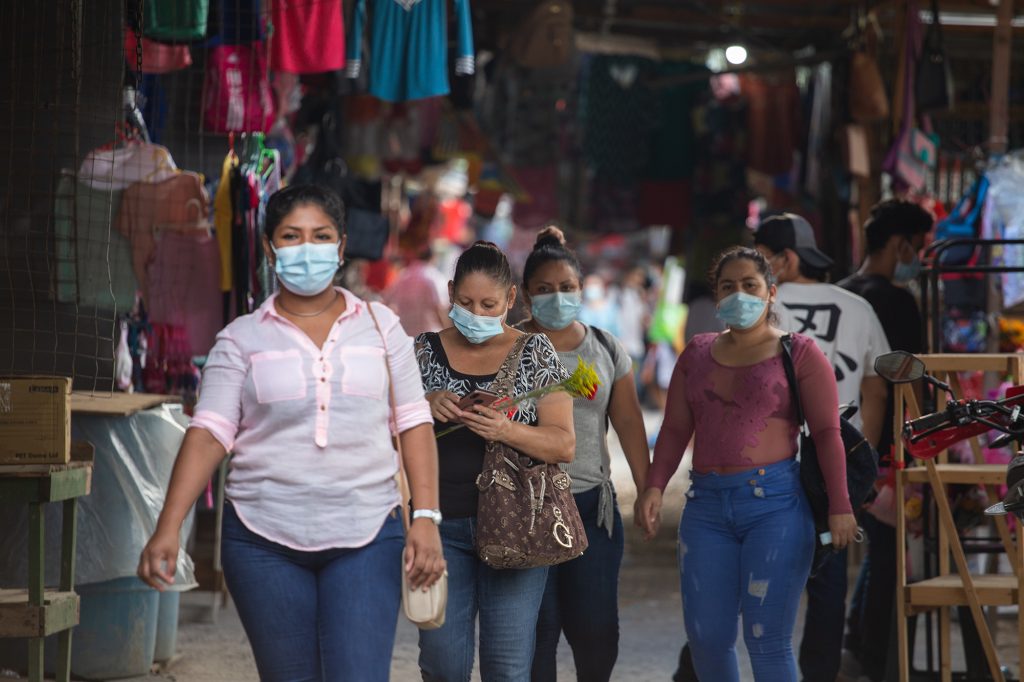
In an April interview with Contracorriente, Argueta said that although the maquilas were up and running again, some incapacitated employees hadn’t been able to return to work. “These people have no income,” she said. She cited a CGT study that found that workers lost up to half of their income in 2020. “Workers usually earn 52 weeks of pay, but in 2020, they got maybe 40%-50% of that. How do they make up the difference? Many companies also took advantage of the situation to incorrectly pay other benefits.” She added that they have formally demanded that all the maquilas address the unpaid furlough claims. They want employers to pay employees their lost wages.
Selvin Enmanuel Peña is a member of the Jasper Honduras labor union, a maquila that operates in the Choloma Free Trade Zone. Peña finds it ironic that the Honduran institutions responsible for protecting worker rights are the ones giving these employers free rein to do as they please. “Employers even have the right to extend furloughs through to December 31, 2021,” said Peña.
He doesn’t believe that employers lost much during the pandemic, and noted that maquilas were able to switch to manufacturing medical supplies and masks. “They were able to manufacture these things with fewer people, which means lower salary costs and fewer services. So they had low operating costs but extremely high product demand, while the rest of us were ignored,” he said.
President Juan Orlando Hernandez promised to give a face mask to every one of the nine million residents of Honduras. The textile sector maquilas were contracted by the government to make masks (US$128,000 contract) and surgical gowns (US$444,000 contract).
Recommended reading (in Spanish): Honduran government subsidizes maquilas but ignores workers
AHM’s general manager, Guillermo Matamoros, has a different perspective. “It was tough for everyone. There are many different but related facets to all of this. In 2020, maquila exports dropped by US$1 billion. But that’s water under the bridge. The important thing now is to recover the momentum we had before the pandemic,” he said. In April 2019, Honduran maquilas exported US$234 million worth of products, but only exported $18 million in April 2020. “That’s only 7 to 8% of the previous year’s exports, a devastating drop,” said Matamoros.
He acknowledges that the pandemic had a heavy impact on workers. “There were repercussions for employment because we had to resort to furloughs. When [product exports] fell, there was no work to do,” he said. But he claims that no jobs have been lost. “There were 173,000 jobs in our industry at the end of 2020, which is 3,000 more than we had in 2019.”
“There were 173,000 jobs in our industry at the end of 2020, which is 3,000 more than we had in 2019,” said AHM’s general manager, Guillermo Matamoros.
Worker rights and the union struggle
Labor attorney María Sabillón believes that the Ministry of Labor had some kind of breakdown because it was taking too long to respond to worker complaints and conduct on-site factory inspections. She suggests the delay was detrimental to workers because they had no other recourse for asserting their rights, and therefore ended up desperately accepting whatever was offered [by the employers]. She contends that the government failed to implement policies to protect the welfare of furloughed workers.
María Luisa Regalado of CODEMUH claims that workers were unable to file complaints about labor abuses during the pandemic. “Where could they file a complaint? The Ministry of Labor was closed for six months. I’m confident that less than 50% of the complaints were even documented because there was nowhere to do so. We even tried sending in complaints by email, but they never responded.”
Regalado also claims that the government only tried to protect the business sector. “The statement [the government] made in March [2020] makes you angry, because what they did was take away our inalienable rights. The [government] quietly abandoned the working class, but not the business sector.”
Maquila workers have long been targets for labor abuses and the pandemic brought more setbacks. But some progress has been made. Currently there are 44 labor unions in textile companies, with about 78,000 members.
Selvin Peña feels that forming the labor union at Jasper Honduras was a significant milestone, because in addition to the financial gains achieved through their collective bargaining agreement, they also garnered more respect for the workers. “Before we had a union, supervisors would yell at workers and inflict all sorts of psychological and verbal abuse. The union has persuaded the company to rectify many areas of discrimination, and workers with musculoskeletal problems that used to be at risk for dismissal are now protected.”
Matamoros believes that the union movement can grow through dialogue and an open-minded approach. Currently, textile maquilas have more unions than any other industry sector in Honduras. He also says they are thinking about other worker benefits like day care centers, commissaries and housing.
Miriam Jimenez, president of the Hanes Brands labor union based in Choloma, says that providing information is an essential role for unions. “Most workers only know what their job responsibilities are, but very few know about their rights.”
She claims that employers exploit this information gap by constantly reminding workers about job responsibilities, but never mentioning their rights, “That’s what we do in the unions. In our meetings, we always talk to our members about their rights and how they can defend them.”
CGT’s Evangelina Argueta feels that achieving decent employment conditions in Honduras is still a far-off goal, because this implies that workers would have good health care, the financial means to get an education, and enough income for the basic basket of goods.
Labor stability is a prerequisite, argues Argueta. “Companies must be stable for employment contracts to be stable. This doesn’t mean that we are allies of the employers, but we must take care of the jobs themselves as well as the workers.” Argueta says that while workers have been asserting their right to unionize for the past nine years, there is still a long way to go. “There are serious problems,” she says.
The union movement has been unable to eradicate every instance of abuse, especially during a pandemic. Sonia and the 430 other workers fired by Delta Apparel are a clear example of this reality. Sonia and six other coworkers are the only terminated employees that have begun to fight for reinstatement. “Justice always arrives late here in Honduras, let alone during a pandemic. We waited for the Ministry of Labor to open up again, and now we’re waiting for a hearing. All these delays have really slowed down our claim,” said Sonia.

